All U.S. Troops Home Now
• Condemn U.S. Attacks on Syrian Sovereignty and Other Gross Violations of International Law
•
Using the UN General Assembly to Justify War and "Regime Change" in Syria • "Friends of Syria" Meet in Tunis, Keep Out Syrian Government
• Is U.S. Preparing for Military Intervention in Syria?
• West Tries to Weaken Syrian Economy to Bring Regime Change
Condemn U.S. Attacks on Syrian Sovereignty and Other Gross Violations of International Law
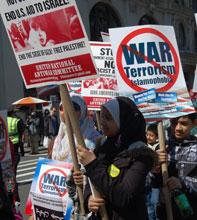 Voice of Revolution condemns the gross violations of international law including attacks on Syrian sovereignty instigated by the U.S. imperialists, using the CIA, Special Forces and members of NATO and Israel. This includes the incursion of British and CIA Special Forces into Syria, as confirmed by the Israeli news agency specializing in intelligence matters, Debka. It includes arming and training terrorists and providing “intelligence” for them to carry out bombings inside Syria — terrorist actions which are then blamed on the Assad government. It includes use of drones and broad spying against Syria and other countries in the region. It includes attempts to get the UN Security Council to pass a resolution which would in effect authorize "regime change" in Syria, vetoed by both Russia and China. And then organizing to have the UN General Assembly to pass a resolution, operating contrary to UN standards for such debate.
Voice of Revolution condemns the gross violations of international law including attacks on Syrian sovereignty instigated by the U.S. imperialists, using the CIA, Special Forces and members of NATO and Israel. This includes the incursion of British and CIA Special Forces into Syria, as confirmed by the Israeli news agency specializing in intelligence matters, Debka. It includes arming and training terrorists and providing “intelligence” for them to carry out bombings inside Syria — terrorist actions which are then blamed on the Assad government. It includes use of drones and broad spying against Syria and other countries in the region. It includes attempts to get the UN Security Council to pass a resolution which would in effect authorize "regime change" in Syria, vetoed by both Russia and China. And then organizing to have the UN General Assembly to pass a resolution, operating contrary to UN standards for such debate.
Information compiled by Global Research informs that according to Debka, the special forces units — operating in tandem with the so-called rebel forces in Homs — "are not engaged in direct combat" against Syrian government forces. They are described by Debka as "tactical advisers," involved in supporting the so-called rebels' communications systems as well organizing the supply and delivery of weapons and ammunition, mostly from Turkey. The dispatch of foreign "fighters" was also mentioned in the report.
Debka also reports that "two foreign contingencies have set up four centers of operation — in the northern Homs district of Khaldiya, Bab Amro in the east, and Bab Derib and Rastan in the north. ..."[2]
"The presence of the British and Qatari troops was seized on by Turkish Prime Minister Tayyip Erdogan for the new plan he unveiled to parliament in Ankara Tuesday, Feb. 7. Treating the British-Qatari contingents as the first foreign foot wedged through the Syrian door, his plan hinges on consigning a new Turkish-Arab force to Homs through that door and under the protection of those contingents. Later, they would go to additional flashpoint cities."
"The presence of foreign troops on the ground inside Syria is in violation of International Law. Support to armed groups — integrated by mercenaries and funded by foreign powers — constitutes a violation of Syria's sovereignty as a nation state," Global Research points out.
"There is ample evidence that this armed insurgency is directly supported by the U.S. and NATO. There is also evidence that these armed groups are responsible for killing civilians and carrying out terrorist acts," the Global Research report concludes.
Notes:
1. DEBKAfile, First Foreign Troops in Syria, February 8, 2012.
2. Ibid.
[TOP]
Using the UN General Assembly to Justify War and "Regime Change" in Syria
Part I -The Monday meeting
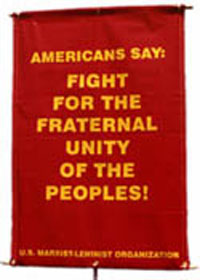 Why did the current president of the UN General Assembly (GA), Ambassador Nassir Abdulaziz al-Nasser of Qatar, call a special meeting of the General Assembly on February 13, a meeting, as several nations noted, outside the regular procedures of the General Assembly?
Why did the current president of the UN General Assembly (GA), Ambassador Nassir Abdulaziz al-Nasser of Qatar, call a special meeting of the General Assembly on February 13, a meeting, as several nations noted, outside the regular procedures of the General Assembly?
The notice for the GA meeting was unusually short, as UN members were only notified on the Thursday night before for a meeting the following Monday morning. So it was not surprising that there were a number of complaints that in addition to procedural violations, normal consultation channels for calling a GA meeting had not been followed.
As the meeting unfolded on Monday, several delegations provided explanations of the customary procedures that had been violated, suggesting that the President of the GA was using his office to manipulate a procedure at the UN to further the political goals of his nation. Also, several of those speaking at the GA on Monday referred to the precedent this was setting for GA meetings in the future. Such a precedent would make it more likely that future Presidents of the GA will call meetings contrary to GA procedures when the person in the presidency has a political purpose.
The meeting went on all day on Monday with several speaking for and against the GA President’s purpose for the meeting to condemn Syria for its clampdown on allegedly “peaceful protest.” Several of those speaking made clear their view that the violent acts of armed opposition and foreign forces who are acting in Syria cannot be considered acts of “peaceful protest”.
Several who spoke referred to the Arab League Observer Mission Report which had verified the presence of armed groups and the Syrian Free Army, and that these armed insurgents were responsible for violent actions against the Syrian government and civilians.
The proposal of the Observer Mission to continue for another month and to work toward a political solution had been quickly dismissed by the Qatar Presidency of the Arab League, just as now the Qatar President of the GA failed to mention the important contribution of the Observer Mission to the understanding of what is happening in Syria. (1)
In his statement to the GA on Monday, the Russian Ambassador, Vitaly Churkin, explained that his nation “regretted the ending of the Observer Mission” and took note of this fact.
Similarly others speaking referred to the importance of this mission.
One of the most comprehensive statements of what is happening both in Syria and at the United Nations was presented by Ambassador Maria Rubiales de Chamorro of Nicaragua on Monday. (2) Her statement deserves serious attention. Following is a summary of her presentation.
The Nicaraguan Ambassador explained that at a Summit meeting of ALBA in early February, an analysis of the situation in Syria was discussed and a condemnation was issued of the policy of the interference in the domestic affairs of Syria, as well as the effort to destabilize Syria.
Also ALBA condemned what it called “armed violence by irregular groups supported by foreign powers against the Syrian people.”
Calling for a return to calm in Syria and support for peaceful reform and national dialogue, she referred to the steps being taken by the government of Syria to arrive at a political solution to the conflict.
But what is interfering with such efforts, she explained, is the fact that the “same script that the forces of NATO and their allies implemented in Libya” is now being applied to Syria.
Ambassador Rubiales de Chamorro pointed to the actions of NATO and its allies against Libya where “these same actors carried out the same practices and policies”.
The “play” in process against Syria that she described, included several acts. She listed these acts as:
1) Provocation
2) Arming of Terrorists
3) Military Intervention
4) Destruction of the Country
5) Juicy Contracts for the Reconstruction of that country that they themselves have destroyed
The Ambassador called on other members of the UN to make clear that “we do not share the hypocritical view of life that is now being labeled R2P.” (Responsibility to Protect)
R2P, she said, “cannot be allowed to become a devious argument to justify foreign intervention in the domestic affairs of states.”
She explained that the Arab League Observer Mission Report had documented that Syria had complied with the protocol setting up the mission and the Arab Plan of Action.(3)
The Syrian government withdrew members of the military from the streets. It released thousands of detainees who had not been involved in acts of violence. It facilitated the work of the foreign media. But yet the very report documenting these conclusions is “now being swept under the carpet,” she noted.
Similarly, the Nicaraguan Ambassador expressed her nation’s appreciation for the initiative of the Russian Federation to offer to mediate a diplomatic, political and peaceful solution to the crisis. She conveyed the full support from her President, Daniel Ortega, to Russia and China for the work they had done in the Security Council in favor of negotiations and a peaceful resolution of the conflict and against instigating a war against Syria.
Despite the fact that several other nations had spoken at Monday’s meeting against the imposition of a regime change program by the Arab League for Syria, when the GA President ended Monday’s meeting, he only summed up the sentiments of those supporting the Arab League program.
The impact of these abuses of UN GA precedents and procedures is that not only the people and government of Syria, but also the very integrity of the UN system itself, are being undermined and jeopardized. The actions of the subsequent meeting that followed on Thursday demonstrated this abuse ever more clearly.
Part II – The Thursday Meeting
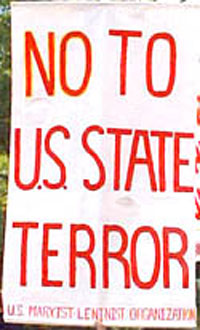 At the Monday GA meeting, Bashar al-Jafari, the Syrian Ambassador effectively challenged not only the substance of the meeting, but also the abuse of the precedent under which it was called. The meeting had allegedly been called for the GA to discuss a Human Rights Report issued by the Human Rights Council in December of 2011. The Syrian Ambassador pointed out that this was an inappropriate activity as the GA Resolution governing how Human Rights reports from the Human Rights Council were brought to the GA was violated.
At the Monday GA meeting, Bashar al-Jafari, the Syrian Ambassador effectively challenged not only the substance of the meeting, but also the abuse of the precedent under which it was called. The meeting had allegedly been called for the GA to discuss a Human Rights Report issued by the Human Rights Council in December of 2011. The Syrian Ambassador pointed out that this was an inappropriate activity as the GA Resolution governing how Human Rights reports from the Human Rights Council were brought to the GA was violated.
The procedure established in Resolution A/Res/65/281 (20 July 2011) was that the Human Rights Council Report to the GA was to be presented in the 3rd Committee of the GA and subsequently in the GA. The Report would cover the period of the prior year from October 1 to September 30 of the current year.(4) The presentation of a December 2011 Human Rights Council Report to a GA Plenary meeting in February 2012 was violating the mandate set in the GA Resolution. Hence holding the GA meeting on Monday, February 13 in violation of the procedures contained in A/Res/65/281 was an illegal activity by the GA President. The Syrian Ambassador had asked that the Monday meeting be suspended to await an impartial decision by the UN Secretariat Legal Council on the actions being taken by the GA President.
The GA President refused to accommodate this request and just continued with his plan for the Monday meeting.
When the Thursday meeting was held, however, in recognition of the correctness of the Syrian Ambassador’s legal objection, the GA Agenda designation for the meeting was changed. The new Agenda designation was under the GA agenda item 34, “Prevention of Armed Conflict”.
Such maneuvers help to demonstrate that the very holding of the GA meeting itself was not in line with the procedures or provisions for General Assembly activity.
If the GA is acting outside of its processes and procedures, then the stage is set for it to go on to endorse a resolution contrary to the Charter of the UN.
The Charter of the UN clearly states that if the Security Council is exercising the functions it is assigned with regard to any dispute, the General Assembly cannot “make any recommendation with regard to that dispute or situation unless the Security Council so requests.”(Chapter II, Article 12(1))
Yet practically the same resolution that was vetoed at the Security Council on February 4, was brought to the GA for a vote on February 16. The Russian Federation asked to amend the resolution with the amendments it had proposed in the Security Council so that the resolution would conform to the requirements of the UN Charter.
These amendments included a provision to not only require that Syrian government military and armed forces withdraw from cities and towns, but that this happen “in conjunction with the end of attacks by armed groups against state institutions and quarters of cities and towns.”
Another provision of the Russian amendments was to replace the requirement of meeting a time table set by the Arab League with the provision that the process would “take into account” the time table set by the Arab League, adding that this would be done “without prejudging the outcome.”
Such amendments could help to prevent the Arab League process from becoming a process in support of the armed insurgents against the Syrian government, and hence a mechanism for regime change, in violation of the obligations of the Charter to respect the sovereignty, and the territorial integrity of Syria. The sponsors of the GA Resolution refused to consider the Russian Federation’s requested amendments.
At the GA meeting on Thursday to consider the resolution against Syria under the Agenda item “Prevention of Armed Conflict”, the representatives of several nations spoke against the resolution, objecting to the fact that it did not take into account that there is an armed insurgency operating against the Syrian government and people.
Instead of the resolution recognizing this problem, as the Arab League Observer’s Mission had recommended, the GA Resolution supported the armed insurgency by requiring the Syrian government to cease military action against that insurgency, but not providing any other means to prevent the actions of the insurgents against the government or people of Syria.
Speaking against the GA Resolution, the Venezuelan Ambassador, Jorge Valero explained (5):
“The Draft resolution denies the Syrian State its right to protect its population and to ensure internal peace and security. The draft asks it to give up the privileges granted to it by the Constitution for ensuring the country’s stability. The draft does not call for – as proposed in the amendment submitted by the Russian Federation, and I quote, it does not call for – ‘all sections of the Syrian opposition to dissociate themselves from armed groups engaged in acts of violence’ nor does it, and I continue to quote from the Russian amendment, nor does it ‘urge Member States and all those in a position to do so to use their influence to prevent continued violence by such groups’.”
Ambassador Valero pointed out the mechanisms of the Arab League plan for Syria that are a violation of Syria’s sovereignty and territorial integrity, and pointed to how the Resolution supported the armed insurgency against the Syrian government and people. This, he explained, was but a repeat of the acts taken by the UN against Libya. Also he expressed his support for the initiatives of the Russian Federation and China, “which have prevented the Security Council from being used to violate the sovereignty of the Syrian Arab Republic.”
Several others who spoke against the draft resolution, either before or after the vote, expressed similar objections, as well as the disappointment that the Russian Federation amendments had not been accepted by the sponsors of the GA resolution.
The vote was taken. More than one quarter of the UN members either did not vote at all, or voted against or abstained. Even some of those who voted in favor of the resolution expressed their support for the Russian amendments.(6)
Speaking after the vote, the Syrian Ambassador expressed his concern not only for his nation, but also for the UN as a whole. He expressed the concern that if the UN continues to send the “erroneous message” that it is acceptable to violate the sovereignty of member states, then this will impact the UN itself morally and politically. “And we will have destroyed the large body of normative efforts for the past 60 years,” he warned.
Watching the process first at the UN Security Council with the draft resolution against Syria, and then at the GA with the draft resolution against Syria, what is surprising is that in this situation, the veto protected the Principles of the Charter at the Security Council, while at the GA, the members could not prevent the abuse of their procedures and subsequently of the Charter. […]
Notes
1) For background see Ronda Hauben, “Defending the UN Charter by Use of the Veto: the SC Resolution on Syria, February 11, 2012, taz.de
http://blogs.taz.de/netizenblog/2012/02/11/defending-the-un-charter/
2) General Assembly Meeting on February 13, 2012
http://www.unmultimedia.org/tv/webcast/2012/02/96th-plenary-meeting-general-assembly- meeting.html. The statement by Nicaragua starts at 42:50
3) “League of Arab States Observer Mission to Syria: Report of the Head of the League of Arab States Observer Mission to Syria for the period from 24 December 2011 to 18 January 2012″
http://www.columbia.edu/~hauben/Report_of_Arab_League_Observer_Mission.pdf
The official UN document distributed January 31 2012 at the UN contained the Observer Report as Enclosure 4 of S/2012/71
4) General Assembly Resolution A/Res/65/281
http://documents-dds-ny.un.org/doc/UNDOC/GEN/N10/529/40/pdf/N1052940.pdf?OpenEl ement20 July 2011
5) General Assembly Meeting on February 16, 2012
http://www.unmultimedia.org/tv/webcast/2012/02/97th-plenary-meeting-general-assembly.html The statement by Venezuela starts at 34:23
6) Vote totals announced on Thursday, February 16. 2012 on the Draft Resolution on Syria (A/66/L.36) “The Situation in the Syrian Arab Republic”
For: 137
Against: 12
Abstaining: 17
Vote problems: 3
Not voting: 24
Total not voting, abstaining, or voting against: 53
Total UN member nations: 193
Draft resolution A/66/L.36
http://daccess-dds-ny.un.org/doc/UNDOC/GEN/N12/232/39/PDF/N1223239.pdf?OpenElement
This article appears on my blog at: http://blogs.taz.de/netizenblog/2012/02/19/un-ga-meeting-syria/
[TOP]
"Friends of Syria" Meet in Tunis but
Keep Out Syrian Government
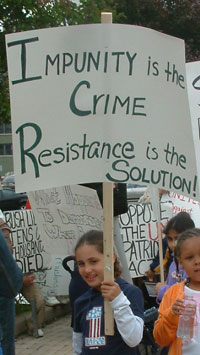 A group known as the “Friends of Syria” started its first conference in Tunis on February 24, calling for an immediate ceasefire in Syria to make way for humanitarian aid to flow into the conflict-torn country.
A group known as the “Friends of Syria” started its first conference in Tunis on February 24, calling for an immediate ceasefire in Syria to make way for humanitarian aid to flow into the conflict-torn country.
Delegates from 60 countries and organizations, including the United States, European and Arab nations, and the Syrian opposition were invited to the conference hosted by Tunisia. However, the conference shut its door to the Syrian government.
Tunisian President Moncef Marzouki made the opening address, saying that Tunis opposed solving the Syrian crisis through external interference and endorsed a plan to send Arab peacekeeping forces to Syria to stop violence and protect civilians.
Marzouki also suggested that a "Yemen-model" should be adopted to help Syria start its democratic transition, meaning that Syrian President Bashar al-Assad should step down and hand over power to his deputy, making way for a transitional process that will help end the bloody confrontation between the government and opposition.
Arab League (AL) Secretary-General Nabil al-Arabi said at the opening that the AL would respect Syria's sovereignty, and refuse any form of foreign intervention so as to prevent a civil war.
The AL would also meet the aspirations of the Syrian people towards freedom and political reform, Arabi said.
The conference then carried on behind closed doors after the opening session.
At the meeting, the group reached consensus on avoiding a militarization of the conflict in Syria. It […]recognized the opposition Syrian National Council as a "legitimate representative" of the Syrian people.
The group also agreed to impose more sanctions against the Syrian government and reduce diplomatic interactions with Damascus.
France said the European Union (EU) would freeze assets of Syria's national bank in EU member countries from Monday.
Meanwhile, U.S. Secretary of State Hillary Clinton vowed to toughen U.S. sanctions against Syria. Clinton also announced at the conference that the United States was providing $10 million to "quickly scale up humanitarian efforts, including support for refugees" in Syria. She warned that the Assad regime would pay a "heavy cost" for "ignoring the will of the international community and violating the human rights of your people."
Russia and China, who vetoed a U.N. Security Council resolution aimed at forcing Assad to step down, refused to attend the conference.
China contended that the function and purpose of the conference was ambiguous, while Russia said that it was unfair to keep out the Syrian government.
As the conference began on Friday, supporters of the Syrian government clashed with police in front of the hotel where the conference was held.
Shouting anti-America and anti-Qatar slogans, demonstrators denounced the expulsion of Syrian diplomats and the ongoing meeting. They termed the gathering "a plot against Syria perpetrated on the Tunisian soil."
Some pro-Syrian political parties in Tunis called the meeting "Enemies of Syria" Conference as the host had only invited the opposition parties to attend.
Since the unrest broke out in Syria last March, the number of casualties in the conflict has been rising steadily amid unrelenting clashes between government forces and opposition fighters.
According to latest reports, six members of a family were murdered by unidentified gunmen in central Homs province on Thursday and another eight law-enforcement troops were killed in clashes with armed groups in several parts of Syria.
The United Nations recently put the death toll in the Syrian unrest at 6,000, while the Syrian government says more than 2,000 army and security personnel have been killed during the 11-month turmoil.
The Syrian government blamed the months-long bloodshed in its country on armed groups backed by foreign powers.
Blaming the bloodshed entirely on the Syrian government, Western powers and some Arab countries have been demanding that Assad relinquish power, a move some suspect amounts to forcing regime change in Syria.
United Nations Secretary-General Ban Ki-Moon on Thursday appointed Kofi Annan, former UN chief, as a joint UN-AL envoy on the Syrian crisis to broker a peaceful resolution to the conflict.
[TOP]
Is U.S. Preparing for Military Intervention
in Syria?
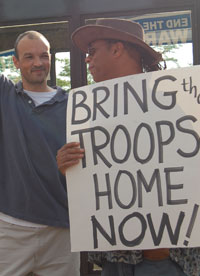 The US and other NATO countries could soon launch a ground assault on Syria. The final decision will be made soon, following this week’s Tunis conference where allied countries will meet to discuss possible scenarios of military intervention.
The US and other NATO countries could soon launch a ground assault on Syria. The final decision will be made soon, following this week’s Tunis conference where allied countries will meet to discuss possible scenarios of military intervention.
Sources in Washington tell Israeli news agency Debka that the Pentagon is currently drafting the approach they want America to take in the Syria ordeal, and once it is ready for the president, Obama could approve military action. Debka adds, however, that the decision will also depend on what U.S. Secretary of State Hillary Clinton takes away from this week’s Tunis conference.
Representatives from 80 countries across the globe are expected to descend on Tunis on February 24 under the name "Friends of Syria." Should Saudi Arabia, Egypt, Qatar and the UAR support a western intervention in Syria, Clinton could offer an endorsement to the Pentagon, who will in turn finish their draft for war plans and send them to the White House for approval. According to Debka's sources, Britain, France, Italy and Turkey are also prepared to send their troops into Syria.
Earlier this month, President Obama seemed to side more with a solution that would save the U.S. from directly dragging itself to war. "I think it is very important for us to try to resolve this without recourse to outside military intervention. I think that's possible," the president told NBC News.
Elsewhere in Washington, some representatives have already openly endorsed aiding the Syrian rebels. Speaking from Kabul, Afghanistan last week, Senator John McCain insisted that the U.S. could offer support to the opponents of Assad without necessarily sending troops of their own over.
"People that are being massacred deserve to have the ability to defend themselves," said McCain, who added, "I believe there are ways to get weapons to the opposition without direct United States involvement."
Senator Lindsey Graham provided more information recently on America's interest in toppling the Syrian government. He advocated aiding the “rebels,” saying that a U.S. intervention to remove al-Assad would assist in hurting Iranian interests in the region. "If the Syrian regime is replaced with another form of government that does not tie its future to the Iranians, the world is a better place," said Graham. […]
[TOP]
West Tries to Weaken Syrian Economy
to Bring Regime Change
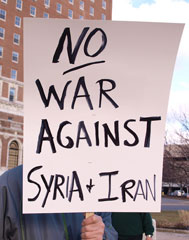 The West has chosen weakening the Syrian economy as a "suitable entrance" to deepen the Syrian crisis after the failure to enflame the situation through other ways, a Syrian economic expert, Adnan Abdul-Razzak, told Xinhua in a recent interview.
The West has chosen weakening the Syrian economy as a "suitable entrance" to deepen the Syrian crisis after the failure to enflame the situation through other ways, a Syrian economic expert, Adnan Abdul-Razzak, told Xinhua in a recent interview.
The Western countries have tried many scenarios in Syria to deepen the crisis, Abdul-Razzak said, and the last-ditch attempt was to throttle the country's economy.
However, the expert predicted that their attempts would not work. "They tried to test Syria through many aspects. They tried the social gate and tried to foment sectarian rifts. But all their attempts were to no avail," he said.
"They even tried the UN Security Council, but they also reached a deadlock... Now there is nothing left other than the economic door to knock on given its unparalleled significance," he added.
Abdul-Razzak said he believed that the economic pressures aim to undermine Syria's infrastructure and to control the course of events.
Due to the economic sanctions imposed by the United States, the European Union and some Arab countries against Syria, most of the economic agreements signed previously between Syria and a number of foreign countries have been brought to a standstill, which has deprived the country of lucrative economic revenues, Abdul-Razzak said.
The Western sanctions have targeted a number of important sectors in Syria, mainly the oil and banking sectors. The losses of Syrian oil sector are estimated at more than 11 million U.S. dollars per day.
Syria's daily oil output is estimated at 380,000 barrels, part of which was exported to Europe to earn for the treasury around 11 million dollars.
Syrian Oil Minister Sufian Allaw recently told Xinhua that Syria's oil sector has lost more than 2 billion U.S. dollars due to the economic sanctions and sabotaging acts against oil facilities.
Abdul-Razzak slammed the sanctions as "immoral," saying that the biggest victims of the sanctions are the Syrian citizens, as the prices of basic foodstuff have skyrocketed while some other goods have become unavailable in the market.
This situation has created a suitable atmosphere for increased monopoly, an issue that has overburdened the citizens, he said.
The economic sanctions have also led to a 40-percent depreciation of Syrian pound and a 20-percent growth in the inflation.
Abdul-Razzak said he believed that there are other foreign and internal factors, including the government's monetary policy, contributing to the depreciation of Syrian pound.
Tourism, a main source of foreign currency for Syria, was affected most by the Syrian crisis, Abdul-Razzak said, noting that the sector had barely revenue in 2011 although the government had made efforts to attract tourists.
However, Abdul-Razzak showed an upbeat mood about the future, saying that the Syrian economy is still vigorous and trustworthy and there are some alternative markets for the Syrian products.
The central bank of Syria has a sufficient reserve of foreign currency and gold, which would appease concerns about a possible economic collapse in the country, Abdul-Razzak said.
"The Syrian economy would not collapse in the foreseeable future," he said, calling on the Syrian government to take rigorous and rational measures to protect the economy. (Xinhua, February 21, 2012
[TOP]
